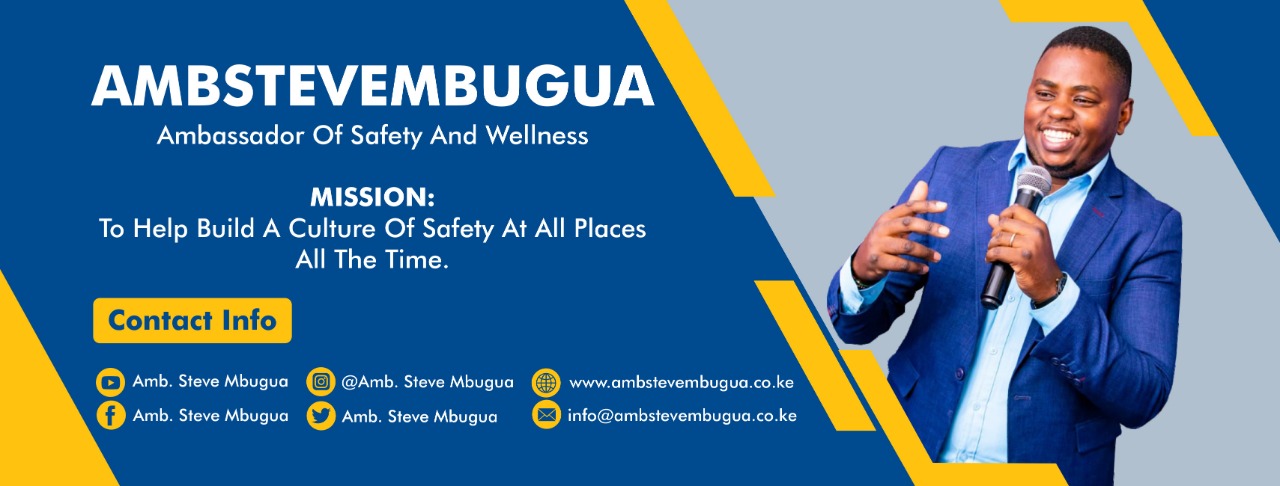A Road Safety Culture
For the last 8 years since 2015, I have been conducting annual Road Safety Campaigns in a mission to lower the traffic accidents statistics. The campaign dubbed #AmbSteveMbuguaRoadSafetyCampaign takes place at different parts of the country.
We have so far lost lives through road accidents in Kenya more than Tripple the number we have lost through Covid-19. Kenya loses on average 4900 lives every year through road traffic accidents. The high rate of road accidents in the world at large is highly worrisome. Many people lost their loved ones on road accidents while many others are injured or disabled. Based on the statistics given by WHO, nearly 1.3 million people die in road accidents each year and on average, 3,287 die daily. More so, 20 to 50 million people are injured or disabled due to road traffic accidents. It is also important to note that road traffic accidents have no respect for anyone or class of people; in other words, rich and poor, young and old etc. are dying in road accidents nearly every day, around the world. Furthermore, it is also known that road traffic accidents constitute the leading cause of death among the youths. For instance, almost 400,000 people under age 25 die in road accidents every year in the world and on average over 1,000 people die per day. The major reason for the high rate of deaths on the road is simply because many road users around the world have not seen road safety as an individual key responsibility. This explains why good road safety culture is almost non-existent in many societies particularly in Africa. Road safety is of prime importance as road accidents are among the biggest causes of deaths in the country. With the number of vehicles on our roads increasing with every passing hour, it’s of vital importance for everyone to have traffic awareness and understand and respect all the road safety rules in Kenya.
Road traffic safety refers to the methods and measures used to prevent road users from being killed or seriously injured. Typical road users include pedestrians, cyclists, motorists, vehicle passengers, skaters, horse riders, and passengers of on-road public transport.
The regular road users include: pedestrians, cyclists, motorists and passengers in public transport. In a simple language, everybody is a road user. Hence, road safety can be described as the methods and measures put in place in order to prevent all road users from being killed or seriously injured.
Traffic Safety Culture includes the values, beliefs, and attitudes that influence road user behaviors and stakeholder actions.
Creating a positive safety culture is integral to helping our nation move toward a highway system with no fatalities. As social beings, we are naturally motivated to choose behaviors consistent with the culture of the groups with whom we identify. Thus, our goal is to cultivate cultures amongst all groups that promote safe road user behavior. By growing a strong Traffic Safety Culture, safe road user behavior is reinforced and sustained by the social dynamics of the groups. Good road safety culture can be referred to as acts and other manifestations of good human behavior toward making the road safer in the society.
Culture itself is a product of various factors, including tradition, history and regulation, and how systems such as education, law enforcement, the labour market, social security, public health and infrastructure function. Thus, culture shapes the society and vice versa. For instance, in many countries attitudes towards drunk driving have changed considerably since the late twentieth century—a cultural change that was the result, at least in part, of changing legislation and increasing enforcement levels. The major cause of Traffic accidents is distracted driving.
Distracted driving is any activity that could divert your attention away from the main task of driving. In 2016, distracted driving contributed to an estimated 21% of fatal collisions according to data from Transport Canada’s National Collision Database.
ROAD SAFETY RULES
• Never Drink & Drive.
• Always Wear Seat Belt.
• Keep a Safe Distance from the vehicle ahead.
• Always Avoid Distractions.
• Never use an unroadworthy vehicles
• Always Drive Within Speed Limit.
• Avoid the Drowsiness While Driving.
• Watch Out For Drivers and other road users.
The National Transport and Safety Authority(NTSA) need to create more awareness and enforcement to help build a solid road safety culture just like NEMA had successfully helped build the culture of not using plastic bags. A combination of NTSA, media and public commitment will no doubt change the statistics. Truly speaking, road traffic accidents are major of the notable issues that haunt many nations in the world today, particularly African countries. However, to build up a good road safety culture that will reduce the high rate of accidents in our societies, the role of the media is very significant in this regard. It can change people’s poor behavior and attitudes towards road safety. In simple language, the media, as it is, have huge importance and influence toward making the road safer for all.
Creating a positive safety culture is integral to helping our nation move toward a highway system with no fatalities. The road safety information that I have been sharing on my blogs provide education and guidance for developing programs and initiatives.
In a good road safety culture, people speak up about any unsafe situations and unsafe behavior of any road users on public roads; they don’t keep silent when any road user violates road safety practices. Every road user in a society where a good road safety culture is in practice will constantly look for ways to improve road safety from his or her own end and take personal responsibility for making the road safe for all. Road Safety is both an individual and collective responsibility. You do not require the presence of NTSA officers, Traffic Police or be around a known ‘black spot’ to be safety conscious. Be courteous and disciplined when on the road. You have to be vigilant, resilient, proactive, cautious, careful, responsible, Alert, Awake and Aware when on the road. Safety starts with Me, You and All of Us. Say No To Unsafe behaviors on the road!
READ ON SAFETY CULTURE
- AMB STEVE MBUGUA
- August 18, 2023
Ambassador Steve Mbugua Road Safety Culture Campaign
Edified by this? share with your friends and loved ones

About the Author
AMB. STEVE MBUGUA
Amb. Steve Mbugua is an enthusiastic Ambassador of Safety and wellness with in-depth training, safety advisory and Workplace Safety Behavior Change Coaching experience. He is the Founder and Executive Director of Makinika Afrika Int’l , a Health and Safety Training Firm in Kenya and Group CEO Nairobi Safety Shop Limited, the largest Security, Safety and Health Store in the East and Central Africa and Managing Director, Stewa Safaris Kenya Limited a Premier Tours and Travels Company in Kenya.
Social Handles
Explore More Blogs

Industrial Safety Helmets Standards and Color Codes
Safety has always been a very important issue in

First Aid Management as part of Occupational Health & Safety
For a better part of my professional journey I

We Gotta Adapt to Live with Corona Virus
Dear friends, We Gotta Adapt to Live with Corona

The Journey of Becoming: Embracing Life’s Process
Introduction I am Ambassador Steve Mbugua, Founder and President

Amb Steve Mbugua Safety Initiatives
My Safety initiatives are instrumental in encouraging workplaces to

Church Planting And Ministry Establishment Dynamics
Church planting and ministry establishment are vital aspects of

INTRODUCING MY ‘OVERCOMING ALL ODDS’ BOOK
Anyone who has ever become anything worth writing home

Fire Safety Management as part of Occupational Health & safety
Fire safety management is a crucial component of workplace

Understanding the Culture of Safety: The Importance of Safety at All Levels
Safety is not merely a set of guidelines but

Your Retirement Might Treat You Abnormally
Your Desk At Your Workplace is Not Permanent. Plan








